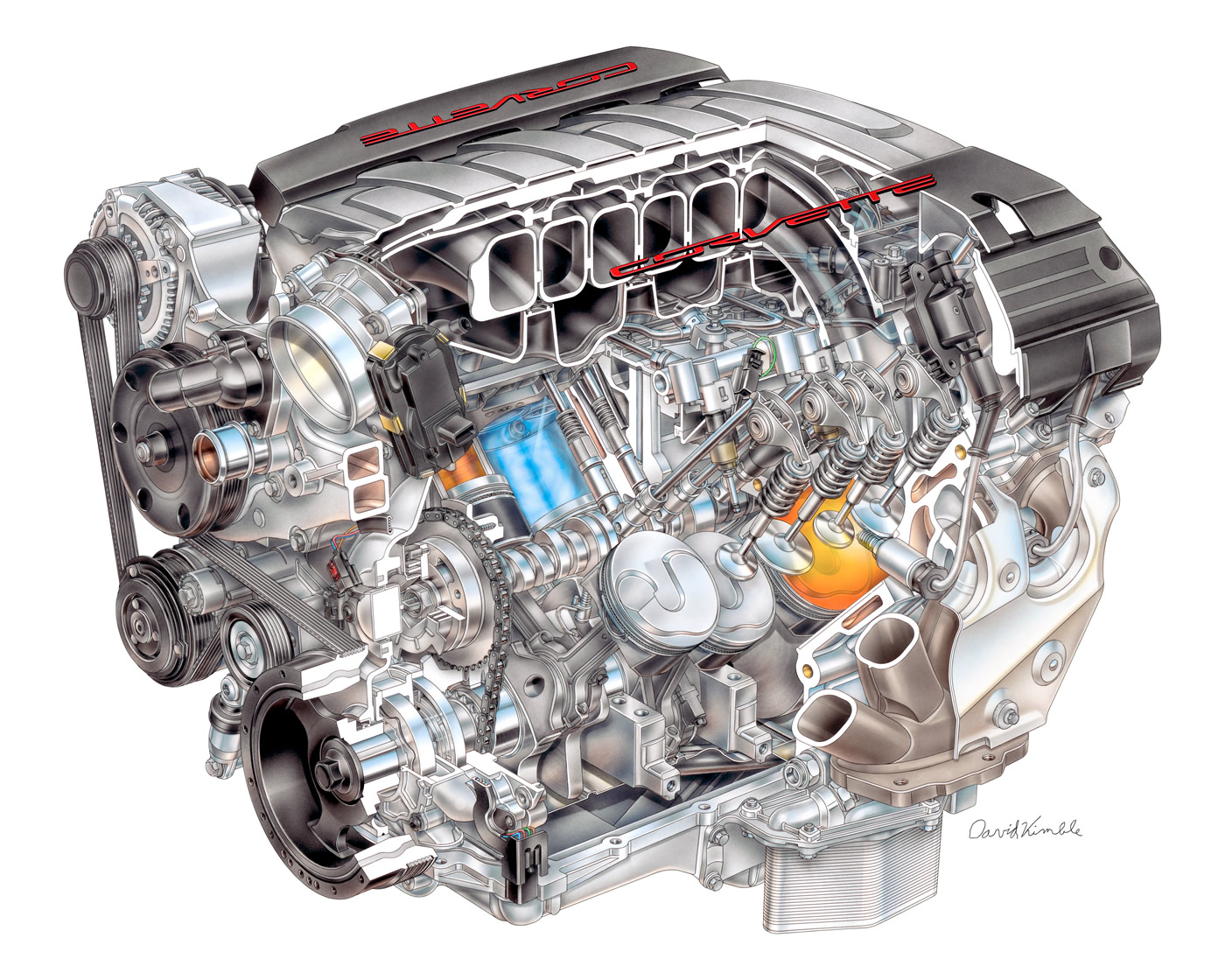2014 C7 Corvette LT1 Fact Sheet #5 - Corvette and Small Block Performance Milestones
Source: GM Media
1955: 265-cid V-8 debuts in the Corvette as an option, with 195 horsepower. Ninety percent of customers select it.
1957: 283-cid V-8 introduced; Rochester mechanical fuel injection helps the Small Block produce 283 horsepower – or one horsepower for every cubic inch.
1959: William Mitchell, vice-president of GM styling, races the original Sting Ray Corvette racing car concept, which features a 315-horsepower version of the fuel-injected 283 Small Block.
1964: 327-cid Small Block is rated at 375 horsepower with Rochester fuel injection; the first Holley four-barrel carburetor is used on a production Small Block engine.
1969: The 350-cid Small Block is introduced in the Corvette. The standard engine is rated at 300 horsepower and an available “L46” version is rated at 350 horsepower.
1970: The first LT-1 debuts in Corvette, rated at 370 horsepower and 380 lb.-ft. of torque.
1972: Final year for the Gen 1 LT-1.
1982: Cross Fire electronic fuel injection introduced, featuring a pair of diagonally opposed throttle bodies feeding a 350 engine and rated at 200 horsepower.
1985: Tuned Port Injection introduced on the Corvette, ushering in modern age of port fuel injection and increasing the Corvette's horsepower rating 230.
1986: Aluminum cylinder heads introduced mid-year on the Corvette.
1987: Hydraulic roller lifters introduced on the “L98” Tuned Port Injection engine, reducing friction for greater efficiency and performance – the Corvette's output jumps to 240 horsepower.
1992: Gen 2 LT1 introduced in the Corvette, featuring reverse-flow cooling system, all-new cylinder heads and computer-controlled ignition timing, pushing horsepower to 300 – a 20-percent jump over the '91 Corvette's L98 engine.
1996: High-output LT4 with 330 horsepower in limited-edition Corvette models is the finale for the Gen 2 engine.
1997: New Gen 3 Small Block debuts in the all-new C5 Corvette, carrying the LS1 name and featuring all-aluminum construction, deep-skirt block and 350 horsepower.
2001: Higher-performance LS6 engine with 385 horsepower powers the new, track-oriented Corvette Z06. Horsepower increases to 405 in 2002.
2005: The Corvette's new, 6.0L LS2 engine with 400 horsepower introduces the Gen 4 Small Block.
2006: Racing-inspired 7.0L LS7 engine debuts in the Corvette Z06 with 505 horsepower features including forged titanium connecting rods, high-flow cylinder heads, titanium intake valves, dry-sump oiling system and more.
2008: The 6.2L Small Block debuts on the Corvette with 430 horsepower.
2009: New Corvette ZR1 receives 638-horsepower, supercharged LS9 Small Block – the most powerful production-car engine ever built by GM and enabling a 205 mph top speed.
2011: GM builds its 100 millionth Small Block on Nov. 29. It is an LS9 engine built at the Performance Build Center, in Wixom, Mich.
2012: Final year for the Gen 4 engine in the Corvette.
2013: New LT1 Gen 5 Small Block debuts in the seventh-generation, 2014 Corvette with preliminary output of 450 horsepower (335 kW) – 231 percent more power from only 42-percent larger displacement. It is the most significant redesign in the Small Block's nearly 60-year history.
# # #
 |
